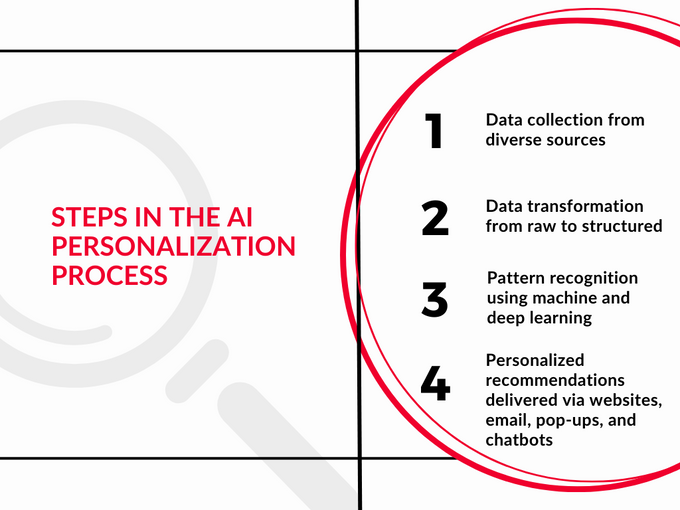AI-Based Personalization: The Future of eCommerce
Updated November 19, 2024

Artificial intelligence (AI) is revolutionizing the way eCommerce businesses connect with their customers. An estimated 70% of eCommerce decision makers believe AI will improve their eCommerce personalization efforts.
At the heart of this transformation is AI's ability to collect and process customer data, enabling you to deliver personalized experiences to your customers. Below, we explore how AI-based personalization is changing the future of eCommerce by assimilating into the entire customer journey:
- Overview of the AI personalization process
- How AI-based personalization affects customers' experience
- How AI personalizes the post-purchase journey for customers and merchants
- Overcoming AI-based personalization challenges for small businesses
- The importance of knowing your customers
Meet the Expert:
- Jameela Ghann is an eCommerce expert with over a decade of experience. Apart from running Alora Boutique, she's also the marketing manager for Fera Product Reviews.
Overview of the AI Personalization Process
The hype around AI in eCommerce lies in its prowess to learn from data. So, moving from data collection to a personalized experience involves several key steps:
- Data Collection Get started by collecting data from diverse sources such as customer interactions, purchase history, and browsing behavior. These data points offer invaluable insights into customer preferences and behaviors.
- Data Transformation This raw data is then transformed into a format that AI models can understand. This involves structuring and cleaning the data to ensure its usability.
- Pattern Recognition AI systems use machine learning techniques, including deep learning, to recognize patterns within the transformed data. This step is vital for understanding customer preferences and predicting future actions.
- Personalized Recommendations Armed with patterns and insights, AI systems generate personalized recommendations. These suggestions are then delivered through various touchpoints like websites, email campaigns, pop-ups, and even chatbots.
Pro tip: Prioritize your customers' data privacy. They share personal information with you to receive a personalized experience, so it's important to maintain transparency and trust.
How AI-Based Personalization Affects Customers' Experience
AI-based predictive personalization goes beyond being a trendy buzzword. Once implemented, it can affect your customers' shopping experience from product discovery to checkout.
- Enhanced Product Discovery In an era where time is of the essence, AI can help customers find products quickly. By analyzing their preferences and behaviors, AI showcases relevant products and content, streamlining the discovery process.
- Hyper-Relevant Content AI can distinguish between various customer preferences. By enhancing this with natural language search, you can deliver highly relevant content and products. For instance, a skincare enthusiast searching for "oil-free products" can also see makeup options suitable for oily skin in addition to lotions.
- Reducing Bounce Rates AI-curated content increases engagement, reducing bounce rates in turn. When customers find what they're looking for effortlessly, they're more likely to stay on your website and explore further.
Suppose you sell supplements online. A customer visits your online store, but doesn't know what kind of supplements they need. So not knowing where to start, they type "I'm tired all the time" into the search bar. AI interprets this query and comes up with a blog post instead of a product. The blog post recommends products that can help the customer beat their fatigue and this eventually leads to a sale. Because AI was able to combine natural language and federated search, it delivered personalized, relevant search results.
» Here's how to implement natural language search and federated search on your eCommerce store
How AI Personalizes the Post-Purchase Journey for Customers and Merchants
AI's influence extends beyond the initial purchase. It can enhance the post-purchase experience for both you and your customers.
Moderate Product Reviews
- Merchant: AI-powered systems can moderate reviews, ensuring harmful or inappropriate content doesn't make it to your website. This reduces the workload on your customer support teams and maintains a positive online environment.
- Customer: Based on its customer data analysis, AI can show customers relevant product reviews only to help them make their buying decisions.
Track Orders in Real Time
- Merchant: AI can automate the order-tracking process, making it less admin-intensive for you. Plus, the transparency your customers will receive as a result enhances their trust and satisfaction.
- Customer: Your customers can check on the progress of their orders whenever they want to. AI updates order statuses and estimated delivery times instantly, so your customers consistently receive up-to-date information about their orders.
Pro tip: When customers receive their orders, make sure to include a personalized message thanking them for their support.
Manage Inventory and Customer Support
- Merchant: AI is especially useful for subscription-based businesses, because it can predict when customers might need to reorder. In turn, you can manage your supply chain and inventory efficiently to meet the predicted demands. As a supporting feature, AI-powered chatbots can help streamline your customer support services by automatically addressing core questions your customers may have.
- Customer: Your customers can receive timely reminders to re-order their favorite items based on purchasing history. Plus, AI can provide immediate support for troubleshooting inquiries, reducing response times and improving overall satisfaction.
Overcoming AI-based Personalization Challenges for Small Businesses
While the benefits of AI-based personalization are evident, smaller eCommerce businesses might face challenges in implementation. Fortunately, there are simple strategies you can try to overcome these.
Firstly, robust AI solutions can be expensive and affordable options can have limited functionality. Plus, you might not need all the functionalities of an advanced AI solution, so you end up paying for something you don't use.
We recommend starting small with a specific AI application. This will be more cost-effective and can ease you into using AI-powered applications if it's unfamiliar to you. Chatbots are an excellent beginner option.
Secondly, you may have limited data and this can hinder AI's effectiveness. So, make sure you collect quality data and structure it well. This will help an AI system to analyze your data effectively.
The Importance of Knowing Your Customers
AI-based personalization doesn't mean replacing the human personal touch completely. While AI can definitely enhance your personalized offerings, it shouldn't do everything from start to finish.
Truly understanding your customer means you'll know important factors like not all shoppers want AI-based personalization on their customer journey. An estimated 43% of the Baby Boomer generation is against AI personalization. In comparison, only 15% of Gen Z feel the same way.
So, your AI and personalization strategies will differ, depending on whether your target audience consists mostly of Baby Boomers or Gen Z.
» You can fine-tune your personalization strategies with these solutions
Adapting and Thriving in an Evolving Landscape
To stay ahead of the evolving AI landscape, eCommerce businesses should:
- Educate themselves: Continuous learning about AI trends and advancements in your industry is crucial.
- Embrace flexibility: Be open to adapting AI for various purposes, keeping an eye on emerging opportunities.
- Prioritize customer experience: The ultimate goal of AI is to enhance your customers' experience, so make sure any AI implementations align with customer needs and preferences.
AI's ability to collect, process, and use customer data for personalized suggestions is transforming the eCommerce landscape. By understanding and harnessing this power, you can:
- Create exceptional customer experiences
- Drive engagement
- Stay competitive in an increasingly AI-driven world
As AI continues to evolve, businesses that prioritize customer-centric AI strategies will undoubtedly reap the rewards of enhanced customer loyalty and business growth.
» AI isn't just limited to personalization: Explore other benefits of AI in eCommerce





